牛津译林版八年级下册Unit 7 International Charities第1课时 课本讲解及词汇拓展(共44张PPT)
文档属性
| 名称 | 牛津译林版八年级下册Unit 7 International Charities第1课时 课本讲解及词汇拓展(共44张PPT) | 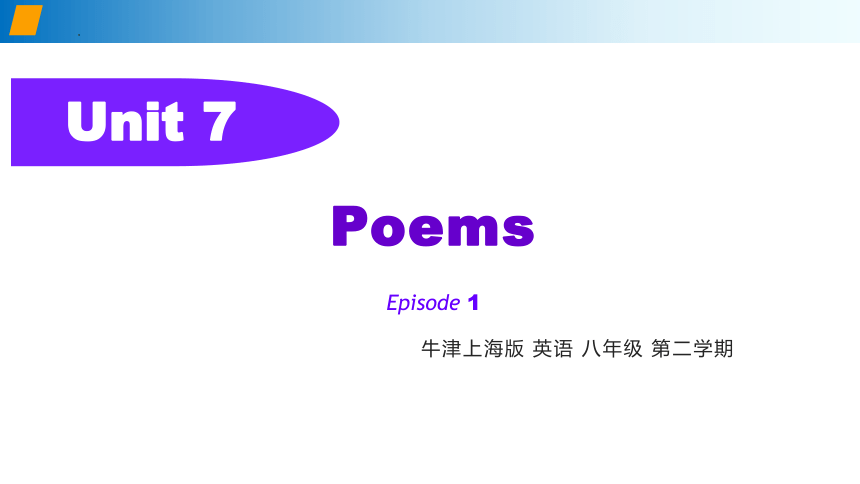 | |
| 格式 | pptx | ||
| 文件大小 | 4.4MB | ||
| 资源类型 | 教案 | ||
| 版本资源 | 牛津译林版 | ||
| 科目 | 英语 | ||
| 更新时间 | 2023-05-07 21:03:32 | ||
图片预览

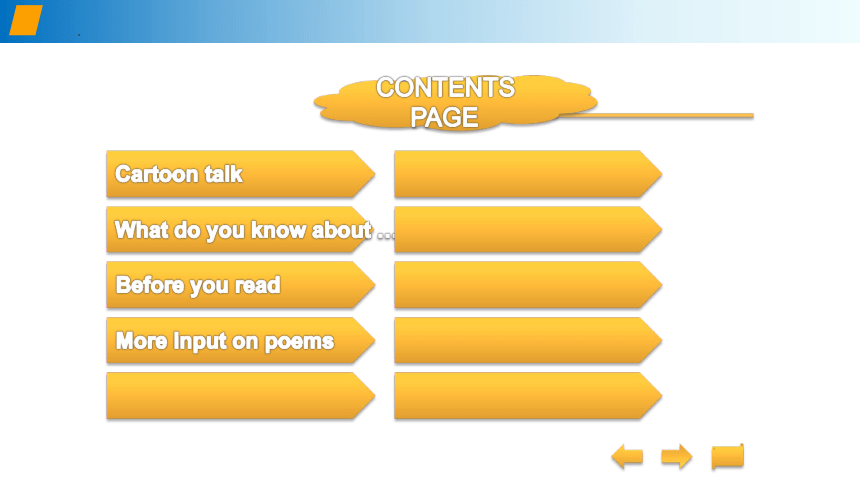
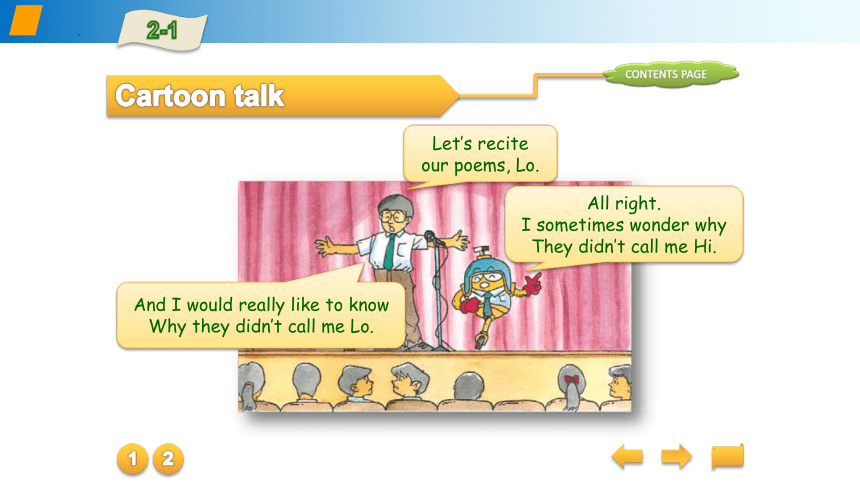
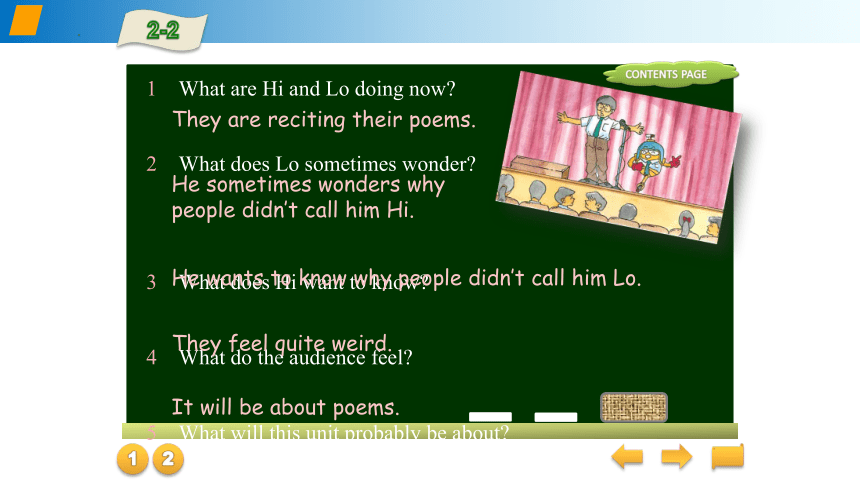
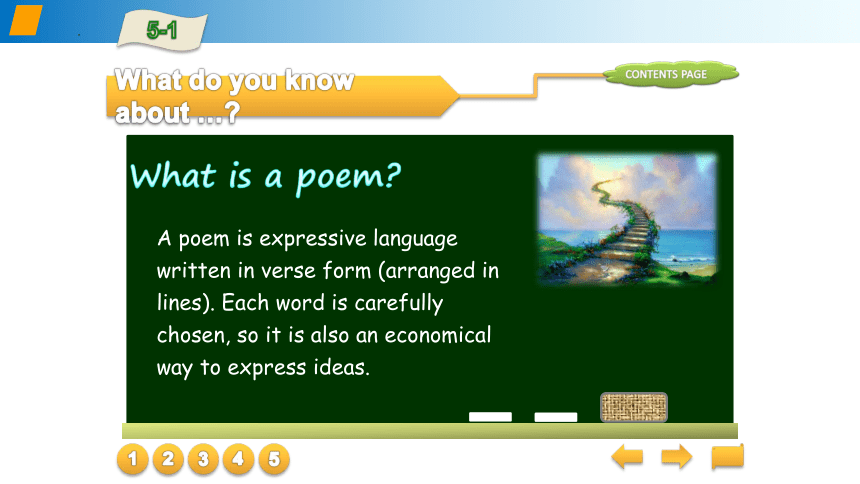
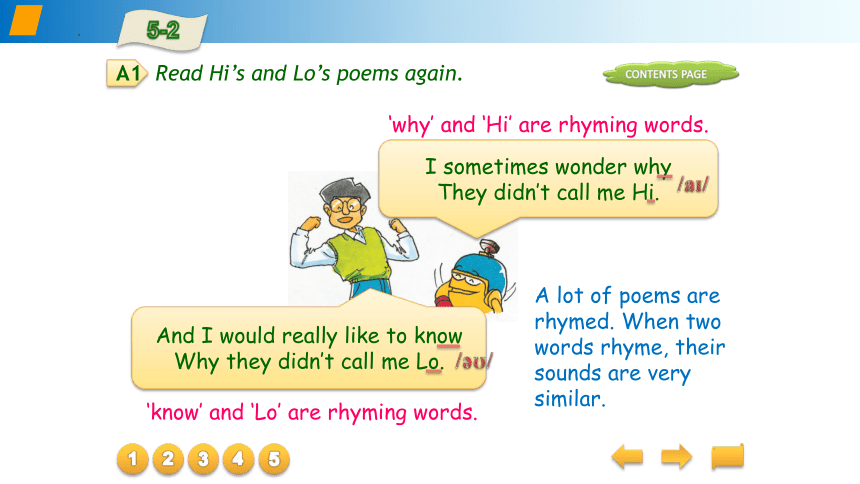
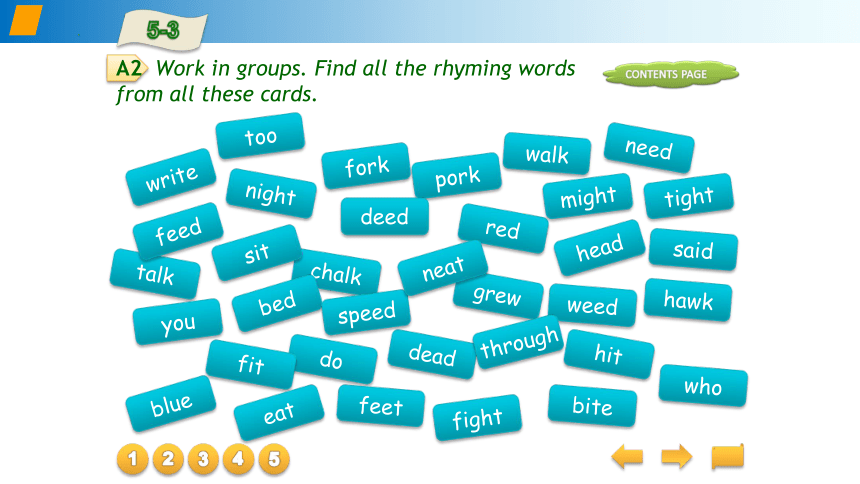
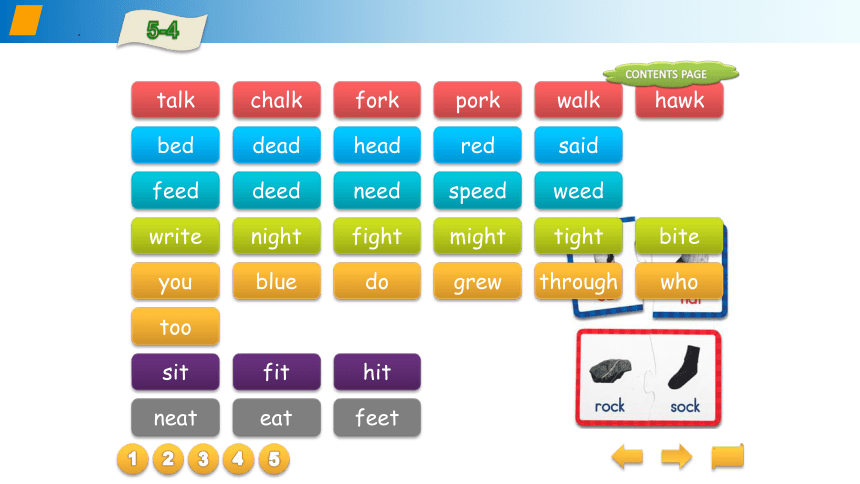
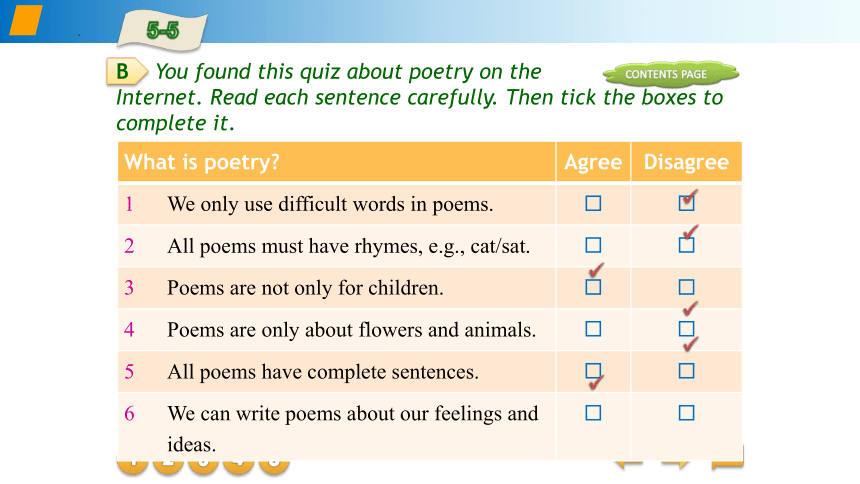
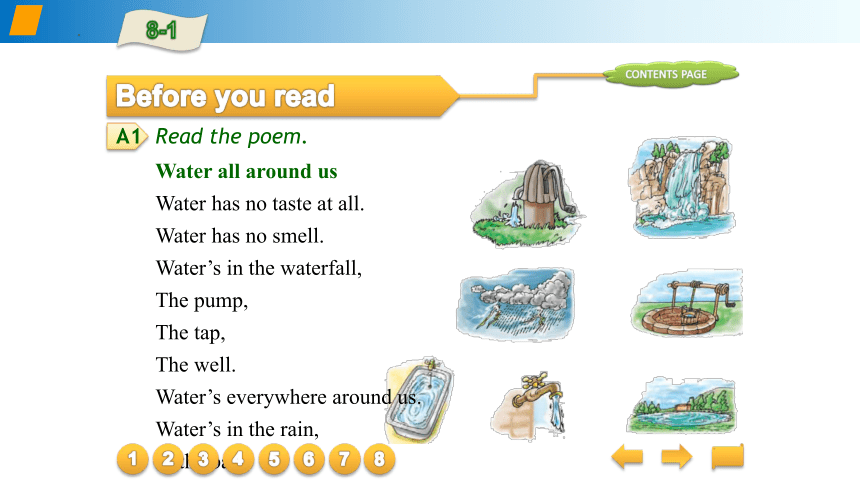
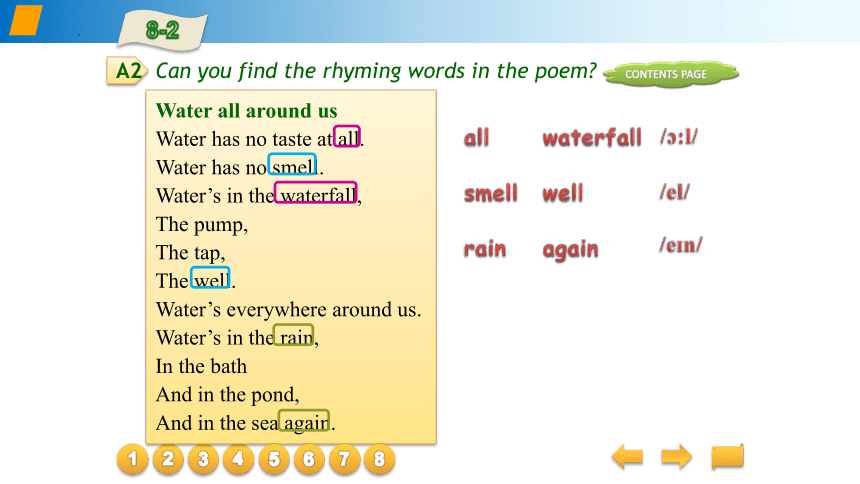
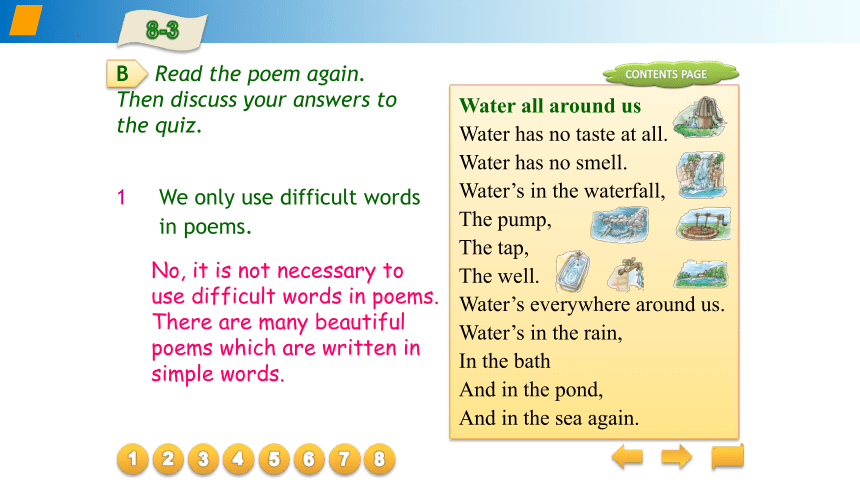
文档简介
(共44张PPT)
Poems
牛津上海版 英语 八年级 第二学期
Unit 7
Episode 1
Cartoon talk
What do you know about …
Before you read
More input on poems
CONTENTS PAGE
Cartoon talk
2-1
1
2
Let’s recite our poems, Lo.
All right.
I sometimes wonder why
They didn’t call me Hi.
And I would really like to know
Why they didn’t call me Lo.
What are Hi and Lo doing now
What does Lo sometimes wonder
What does Hi want to know
What do the audience feel
What will this unit probably be about
They are reciting their poems.
He sometimes wonders why
people didn’t call him Hi.
He wants to know why people didn’t call him Lo.
They feel quite weird.
2-2
1
2
It will be about poems.
What do you know about …
5-1
1
2
3
4
5
What is a poem
A poem is expressive language written in verse form (arranged in lines). Each word is carefully chosen, so it is also an economical way to express ideas.
5-2
1
2
3
4
5
A1 Read Hi’s and Lo’s poems again.
I sometimes wonder why
They didn’t call me Hi.
And I would really like to know
Why they didn’t call me Lo.
/a /
/ /
‘why’ and ‘Hi’ are rhyming words.
‘know’ and ‘Lo’ are rhyming words.
A lot of poems are rhymed. When two words rhyme, their sounds are very similar.
talk
chalk
fork
pork
walk
hawk
bed
dead
head
red
said
feed
deed
need
speed
weed
write
night
fight
might
tight
bite
you
blue
do
grew
through
who
too
sit
fit
hit
neat
eat
feet
5-3
1
2
3
4
5
A2 Work in groups. Find all the rhyming words from all these cards.
talk
chalk
fork
pork
walk
hawk
bed
dead
head
red
said
feed
deed
need
speed
weed
write
night
fight
might
tight
bite
you
blue
do
grew
through
who
too
sit
fit
hit
5-4
1
2
3
4
5
neat
eat
feet
B You found this quiz about poetry on the
Internet. Read each sentence carefully. Then tick the boxes to complete it.
5-5
1
2
3
4
5
What is poetry Agree Disagree
We only use difficult words in poems.
All poems must have rhymes, e.g., cat/sat.
Poems are not only for children.
Poems are only about flowers and animals.
All poems have complete sentences.
We can write poems about our feelings and ideas.
Water all around us
Water has no taste at all.
Water has no smell.
Water’s in the waterfall,
The pump,
The tap,
The well.
Water’s everywhere around us.
Water’s in the rain,
In the bath
And in the pond,
And in the sea again.
Before you read
8-1
1
2
3
A1 Read the poem.
4
5
6
7
8
A2 Can you find the rhyming words in the poem
1
2
3
8-2
4
Water all around us
Water has no taste at all.
Water has no smell.
Water’s in the waterfall,
The pump,
The tap,
The well.
Water’s everywhere around us.
Water’s in the rain,
In the bath
And in the pond,
And in the sea again.
all
waterfall
smell
well
rain
again
/ :l/
/el/
/e n/
5
6
7
8
Water all around us
Water has no taste at all.
Water has no smell.
Water’s in the waterfall,
The pump,
The tap,
The well.
Water’s everywhere around us.
Water’s in the rain,
In the bath
And in the pond,
And in the sea again.
B Read the poem again. Then discuss your answers to the quiz.
1
2
3
8-3
4
We only use difficult words in poems.
No, it is not necessary to use difficult words in poems. There are many beautiful poems which are written in simple words.
5
6
7
8
Water all around us
Water has no taste at all.
Water has no smell.
Water’s in the waterfall,
The pump,
The tap,
The well.
Water’s everywhere around us.
Water’s in the rain,
In the bath
And in the pond,
And in the sea again.
All poems must have rhymes, e.g., cat/sat.
No, there are many different formats for poems and not all poems rhyme.
1
2
3
8-4
4
5
6
7
8
Water all around us
Water has no taste at all.
Water has no smell.
Water’s in the waterfall,
The pump,
The tap,
The well.
Water’s everywhere around us.
Water’s in the rain,
In the bath
And in the pond,
And in the sea again.
Poems are not only for children.
Yes, poems are for people of any age. We usually call poems for young children nursery rhyme.
1
2
3
8-5
4
5
6
7
8
Water all around us
Water has no taste at all.
Water has no smell.
Water’s in the waterfall,
The pump,
The tap,
The well.
Water’s everywhere around us.
Water’s in the rain,
In the bath
And in the pond,
And in the sea again.
Poems are only about flowers and animals.
No, some poems are about these subjects but there are poems about any topic you can imagine.
1
2
3
8-6
4
5
6
7
8
Water all around us
Water has no taste at all.
Water has no smell.
Water’s in the waterfall,
The pump,
The tap,
The well.
Water’s everywhere around us.
Water’s in the rain,
In the bath
And in the pond,
And in the sea again.
All poems have complete sentences.
No, many poems do not follow the rules of standard English. Poems often play and experiment with the language.
1
2
3
8-7
4
5
6
7
8
Water all around us
Water has no taste at all.
Water has no smell.
Water’s in the waterfall,
The pump,
The tap,
The well.
Water’s everywhere around us.
Water’s in the rain,
In the bath
And in the pond,
And in the sea again.
We can write poems about our feelings and ideas.
Yes, most poems are about feelings and ideas.
1
2
3
8-8
4
5
6
7
8
In the winter
Watch us go,
Making footprints
In the snow.
In the spring
My boots are wet.
See how deep
The puddles get.
In the summer
By the sea,
Sandy footprints
Made by me.
In the autumn
Trees are brown,
I kick the leaves
All over town.
More input on poems
6-1
1
2
3
A1 Do you still remember this poem Find the rhyming words in each verse.
Footprints
/ /
/et/
/i:/
/a n/
4
5
6
6-2
1
2
3
When we read a poem, we usually read through it once quickly to get a feel for its sound. Then we go back and reread the poem to get a closer understanding of what the poem is trying to say.
How to read a poem
4
5
6
A2 Read the poem again.
6-3
1
2
3
In the winter
Watch us go,
Making footprints
In the snow.
In the spring
My boots are wet.
See how deep
The puddles get.
In the summer
By the sea,
Sandy footprints
Made by me.
In the autumn
Trees are brown,
I kick the leaves
All over town.
Footprints
4
5
6
B1 Read another poem and do the following
exercises.
6-4
1
2
3
Sometimes my homework is short.
Sometimes my homework is long.
But no matter what,
My homework is often wrong!
Sometimes my homework is hard.
Sometimes my homework is easy.
But no matter what,
My homework always makes me dizzy!
Sometimes my homework is boring.
Sometimes my homework is interesting.
But no matter what,
My homework often has me snoring!
Circle the rhyming word.
Underline the words or phrases that are repeated.
Give the poem a title.
My homework
4
5
6
B2 Read the poem again and choose the correct
picture for this poem.
6-5
1
2
3
Sometimes my homework is short.
Sometimes my homework is long.
But no matter what,
My homework is often wrong!
Sometimes my homework is hard.
Sometimes my homework is easy.
But no matter what,
My homework always makes me dizzy!
Sometimes my homework is boring.
Sometimes my homework is interesting.
But no matter what,
My homework often has me snoring!
4
5
6
6-6
1
2
3
Poems use many other techniques besides rhyme to express an idea or feeling. Usually they have a particular meter or rhythm. Sometimes a word, a phrase or a sound will be
repeated throughout the
poem. Tell the students to
look for any patterns or
special features of language
when they read a poem.
4
5
6
1. site n. 建筑工地
e.g. Protective helmets must be worn on site.
在工地必须戴防护帽。
二、新课单词拓展
2. narrow adj. 狭窄的;狭隘的
e.g. The bridge is too narrow for two cars to pass. 这桥太窄,并排通不过两辆车。Be careful when you back into the garage, the doorway is very narrow.
你倒车进入车库时要小心,门道很窄。
【知识拓展】 narrow的反义词是wide。e.g. The stream is too wide for me to jump across.
这条溪流太宽了,我跳不过去。
3. scared adj. 害怕;恐惧,畏惧;担
e.g. He's scared of heights. 他有恐高症。
People are scared to use the buses late at night.
人们害怕在深夜乘坐公共汽车。
【知识拓展】 scare v. 惊吓;使害怕;使恐惧e.g. It scared me to think I was alone in the building.
想到楼里只有我一个人,怪害怕的。
4. attention n. 注意;专心;留心;注意力
e.g. He turned his attention back to the road again.
他把注意力转回到道路上。
Small children have a very short attention span.
幼儿的注意力持续时间很短。
5. scold v. 训斥,责骂(孩子)
e.g. He scolded them for arriving late.
他责骂他们迟到了,训了他们一通。
6. pleased adj.高兴的;满意的
e.g. She always seems very pleased.
她看起来总是很高兴的样子。【知识拓展】
pleasure n. 愉快;快乐e.g. His grandchildren afforded him his greatest pleasure in his old age.他的孙子和孙女们在晚年的时候给了他最大的欢乐。
7. chat v. 闲聊;闲谈;聊天
e.g. My kids spend hours chatting on the phone to their friends.
我的几个孩子在电话上和他们的朋友聊天一聊就是几个小时。
Within minutes of being introduced they were chatting away like old friends.他们经人介绍认识才几分钟,便一见如故地聊个没完。
8. alone adv.独自e.g. I don’t like going out at night alone.alone还可做形容词 “独自的”e.g. Finally the two of us were alone together.
指点迷津:alone与lonely alone作形容词只表示客观上一个人,且在句中只做表语,作副词时,表示 “独自,单独”
lonely表示 “寂寞的”,可说明人,也可说明life, days, years.可用作表语或定语.e.g. He has been very lonely since his wife left him. a lonely(孤单的) traveler a lonely(荒凉的) island
9. author n.作者
e.g. Who is your favorite author
近义词: writer
10. pretend v.假装
e.g. He pretended to his family that everything was fine.
pretend to do sth 假装做某事
11. score n.打分
e.g. What’s the score now
v.得分 e.g. He scored again in the second half.
1.—________ (spell) it, please.
—K-E-Y.
2.Please look at the sign. It says, “No ________ (swim).”
3.Don’t ________(fight)with your classmates.
4.Please ______ (call) me at 851-3642.
5.________ (follow) the map, walk straight on and the bookshop is on your left.
6.Is this your watch Please ______ (ask) the teacher for it.
7.She wasn’t really crying, she was just ______. (pretend)
8.Don’t _______ at your classmates when they are making mistakes. (laughter)
9.“Please be quiet. No ________ (talk)!” says our Chinese teacher.
10.Please ________ (wash) your hands before dinner.
随堂小练一
1.Spell
【详解】句意:——请拼写它。——K-E-Y。此句是祈使句的肯定形式,应填动词原形,故填Spell。
2.swimming
【详解】句意:请看指示牌。上面写着“禁止游泳”。此处是固定结构“no+doing”,表示“禁止做某事”,故填swimming。
3.fight
【详解】句意:不要和同学打架。fight“打架”,动词,don’t的后面要用动词原形,故填fight。
4.call
【详解】句意:请拨打851-3642给我打电话。call“打电话”,句子是祈使句,以动词原形开头。故填call。
5.Follow
【详解】句意:按照地图直走,书店在你的左边。follow“跟随,按照”;根据题干可知此句为祈使句,动词用原形,首字母要大写。故填Follow。
6.ask
【详解】句意:这是你的手表吗?请向老师索要。句子是祈使句,以动词原形开头。故填ask。
7.pretending
【详解】句意:她没有在真的哭,她是在装哭。crying正在哭,句子为过去进行时,结构为:主语+be动词+动词-ing形式;故第二句根据句意也用过去进行时。was后用动词-ing形式。pretend意为“假装”,其现在分词为pretending。故填pretending。
8.laugh
【详解】句意:当你的同学犯错误时,不要嘲笑他们。laughter“笑,笑声”,名词。根据“Don’t”可知,句子为祈使句的否定形式,此时Don’t后应接动词原形,故应用laugh“笑”。故填laugh。
9.talking
【详解】句意:“请安静。不要讲话!”我们的语文老师说。talk“说话,讲话”。根据“Please be quiet. No”可知,空格处句子为“No+动名词”构成的祈使句的否定形式,表示“禁止做某事”。故填talking。
10.wash
【详解】句意:请在晚餐前洗手。本句省略第二人称主语you,且表示劝告、建议,是祈使句,用动词原形开头。故填wash。
11.Don’t ________ (forget) to write to me.
12.Don’t be ________ about me, I will take care of myself. (worry)
13.________ ( not look) out of the window in class, Tom.
14.How ________ (care) she was! She cut herself.
15.Children, ________ (not be) late next time.
16.She can draw very ________ (good).
17.In 1885, Dr John Stith Pemberton made up some cough ________ (medical).
18.If you have to wait for a day for the airplane, you may become ________. (patient)
19.Girls are ________ to take buses late at night. (scare)
20.My grandmother lives all on _______ (she) own.
随堂小练二
11.forget
【详解】句意:别忘了给我写信。forget“忘记”,动词;本句是祈使句的否定形式,结构是Don’t+动词原形,所以空处用动词原形,故填forget。
12.worried
【详解】句意:别为我担心,我会照顾好自己的。be worried about sb“担心某人”,形容词作表语,故填worried。
13.Don’t look
【详解】句意:汤姆,上课时不要从窗口往外看。根据语境可知,此句是否定祈使句:don’t+动词原形,故填Don’t look。
14.careless
【详解】句意:她是多么粗心呀!她切伤了自己。根据感叹句结构可知此处应填形容词,而由“She cut herself”可知应是粗心的,故填careless。
15.don’t be
【详解】句意:孩子们,下次不要迟到。此句是否定祈使句,结构为don’t+动词原形。故填don’t be。
16.well
【详解】句意:她画得很好。此处应用副词修饰动词draw,所给的词good“好的”是一个形容词,well“好地”,副词,故填well。
17.medicine
【详解】句意:1885年,John Stith Pemberton医生研制了一些止咳药。根据“some cough”可知,研制了一些止咳药,medicine“药”,不可数名词,故填medicine。
18.impatient
【详解】句意:如果你不得不等一天飞机,你可能会变得不耐烦。根据“If you have to wait for a day for the airplane”可知,这里指可能会变得不耐烦,patient意为“耐心的”,其相反意义的词为impatient,意为“不耐烦的”,形容词在句中作表语,故填impatient。
19.scared
【详解】句意:女孩们害怕晚上太晚乘公交车。scare“害怕”,动词。根据“Girls are...to take buses late at night.”可知空处缺少形容词作表语,修饰人,scared“害怕的”,形容词。故填scared。
20.her
【详解】句意:我奶奶独自一人生活。on one’s own意为“单独地;独自地”,句子主语为My grandmother,因此one’s应用形容词性物主代词her来表示。故填her。
21. Most people agree that _______(honest)is a good thing.
22.Are you brave enough ________(express)your opinion in front of people
23.—I’m very __________ (please) that we’ve had a pleasant time here. Thanks a lot.
—My __________ (please).
24.I enjoy the ________ (feel) of sharing the stories with friends.
25.What a ________ day it is! (sun)
26.As we all know, ________ (smile) often can help you make more friends.
27.Steve, ________ (listen) to the teacher carefully in class!
28.Let’s ________(save) the pandas.
29.It was ________ (fair) that she did all the chores.
30.—What’s his _______ (high)
—He’s 180 cm tall.
随堂小练三
21.honesty
【详解】句意为:大多数人都认可诚实是一件好事。此空为从句的主语,应填honest的名词形式honesty“诚实”。故填honesty。
22.to express
【详解】句意:你有足够的勇气在众人面前表达自己的观点吗?be adj. enough to do sth“足够……做某事”,动词不定式作结果状语,故填to express。
23. pleased pleasure
【详解】句意:——我很高兴我们在这里度过了愉快的时光,非常感谢。——这是我的荣幸。由第一个空前的be动词可知,这里需要形容词,表示“高兴的,开心的”pleased;第二个空前是my,形容词性物主代词后跟名词,表示我的“荣幸”pleasure。故填pleased;pleasure。
24.feeling
【详解】句意:我喜欢和朋友们分享故事的感觉。feel“感觉”,动词。此处位于the和of之间,应用名词feeling,此处是特指和朋友们分享故事的感觉,名词用单数。故填feeling。
25.sunny
【详解】句意:多么晴朗的一天啊!空格处修饰名词“day”可知用形容词,sun“太阳”,名词,其形容词是sunny“晴朗的,阳光充足的”。故填sunny。
26.smiling
【详解】句意:众所周知,经常微笑可以帮助你交到更多的朋友。空处在句中作主语,表示抽象动作,所以用动名词形式,故填smiling。
27.listen
【详解】句意:史蒂夫,在课上仔细听老师上课。表示命令,用祈使句,以动词原形开头。故填listen。
28.save
【详解】句意:让我们来拯救熊猫吧。句中“let”是使役动词,其后接动词原形。故填save。
29.unfair
【详解】句意:她做所有的家务活是不公平的。根据“she did all the chores”可知此处应用“fair”的反义词“unfair”,表示“不公平的”,作表语。故填unfair。
30.height
【详解】句意:——他有多高?——他身高180厘米。根据“He’s 180 cm tall.”可知,问的是身高,用high对应的名词height“身高”。故填height。
I was 15 months old, a happy carefree kid, until the day I fell. It was a bad fall. I landed on a piece of glass that cut my eye badly. My mom found a doctor who knew that if the eye was removed, my face would look ugly. From then on, my injured, sightless, cloudy gray eye lived on with me.
Sometimes people asked me embarrassing(使人难堪的) questions. When kids played games, I was always the “monster”. I grew up imagining that everyone looked down on(瞧不起) me.
Yet Mom would say to me, “Hold your head up high and face the world.” I began to depend on that saying.
As a child, I thought mom meant, “Be careful or you will fall down or bump into something because you are not looking.” As a teenager, I usually looked down to hide my shame. But I found that when I held my head up high, people liked me.
In high school I even became the class president, but on the inside I still felt like a monster. All I really wanted was to look like everyone else. When things got really bad, I would cry to my mom and she would look at me with loving eyes and say, “Hold your head up high and face the world. Let them see the beauty that is inside.”
When I met the man who became my husband, we looked each other straight in the eye, and he told me I was beautiful inside and out.
My mom’s love was the sunshine that made me bright that gave me confidence. I had faced hardships, and learned not only to appreciate myself but to have deep compassion(怜悯) for others.
“Hold your head up high” has been heard many times in my home. Each of my children has felt its invitation. I say it to my children. The gift my mom gave me will live on.
31.The word “carefree” in the first line probably means “________” in Chinese.
A.无忧无虑的 B.无拘无束的 C.小心翼翼的 D.与众不同的
32.Why did the writer’s mother tell her to hold her head up high and face the world
A.Because her mother wanted to be careful.
B.Because her mother wanted her to be confident.
C.Because her mother didn’t want her to be seen as a “monster”.
D.Because her mother wanted to stop her from getting hurt.
33.Which of the following is TRUE according to the article
A.The writer managed to get over her disability in high school.
B.The writer gave her children encouragement and love, as her mother had given her.
C.The writer was always confident after the accident.
D.In high school the writer was chosen to be president of the student’s union.
34.The underlined sentence “Each of my children has felt its invitation” means her children ________.
A.each received an invitation from her mother
B.didn’t quite understand the meaning of her words
C.faced the same difficulty as their mother
D.learned a lot from their mother’s words
35.Which would be the best title for the article
A.My Mom’s Gift to Me. B.How I Found My Life-partner.
C.My Terrible Childhood Accident. D.Disability Is No Shame.
随堂小练四
31.A 32.B 33.B 34.D 35.A
【导语】本文主要讲述了因为意外失去视力的我在妈妈的鼓励之下仍然自信地生活,得到爱并传递爱的故事。
31.词句猜测题。根据“I was 15 months old, ”可知我才15个月大,因此是无忧无虑的。故选A。
32.推理判断题。根据第二段的“I grew up imagining that everyone looked down on(瞧不起) me.”可知我从小想象每个人都看不起我。因此妈妈的话是为了让我自信。故选B。
33.细节理解题。根据最后一段的“Hold your head up high” has been heard many times in my home… I say it to my children.”可知“昂首挺胸”在我家听过很多次了,我对我的孩子们也会这样说。因此选项B正确,作者把母亲的鼓励和爱也传递给自己的孩子。故选B。
34.推理判断题。根据倒数第二段的“I had faced hardships, and learned not only to appreciate myself but to have deep compassion(怜悯) for others.”可知我面对困难,不仅学会了欣赏自己,而且学会了对他人深表同情。因此作者把这句话传给孩子后,孩子也从中学到了很多,选项D“从他们妈妈的话中学到很多”符合。故选D。
35.最佳标题题。通读全文可知,作者在母亲的鼓励下变得自信,最后成为一个有爱的人,并把这个传递给孩子,选项A“妈妈给我的礼物”符合。故选A。
Mom Knows Best
When I was a little baby crying all night, my mom sang to me and stayed by my side. When I was tired and hungry, she gave me food and warm arms to sleep in.
When I was two running through the field, she made sure I was safe and kept me from danger. When I fell and hurt myself, she gave me a hug and lifted me up.
When I was seven coughing badly, she said no ice-cream for me.
But I talked back loudly, “I should be allowed to eat some! Give it to me now!” When I was a teen going out with friends, she said, “Please be back by ten!” But I talked back again—“I should not be told what to do! I’m seventeen now!”
Now I’m an adult, thinking back to those times. I coughed for days after eating that ice-cream.
And was late for school from staying out past ten. I regret talking back, not listening to Mom.
Mom knows best, and for me she wanted only the best!
36.The first verse(诗节) mainly tells us that ________
A.Mom was strict with “me” B.Mom took good care of “me”
C.Mom knew everything D.Mom was good at hugging
37.The author began to talk back to his mum at the age of ________.
A.seven B.nine C.ten D.seventeen
38.What does the underlined word “regret” probably mean
A.后悔 B.庆幸 C.坚持 D.继续
39.What do you think “I” may not say to Mom now
A.I love you, Mom. B.Thank you, Mom. C.I’m sorry, Mom. D.Goodbye, Mom.
随堂小练五
36.B 37.A 38.A 39.D
【导语】本文是一首关于妈妈的诗。
36.推理判断题。根据“When I was a little baby crying all night, my mom sang to me and stayed by my side. When I was tired and hungry, she gave me food and warm arms to sleep in.”可知妈妈会无微不至的照顾“我”。故选B。
37.细节理解题。根据“When I was seven coughing badly, she said no ice-cream for me. But I talked back loudly,”可知作者7岁的时候开始顶嘴。故选A。
38.推理判断题。根据“And was late for school from staying out past ten.”可知作者没听妈妈的话,所以上学迟到了,所以很后悔没听妈妈的话。故选A。
39.推理判断题。诗中表达了作者对妈妈的爱、感谢和抱歉。故选D。
愿君皆有所获,皆有所得
Poems
牛津上海版 英语 八年级 第二学期
Unit 7
Episode 1
Cartoon talk
What do you know about …
Before you read
More input on poems
CONTENTS PAGE
Cartoon talk
2-1
1
2
Let’s recite our poems, Lo.
All right.
I sometimes wonder why
They didn’t call me Hi.
And I would really like to know
Why they didn’t call me Lo.
What are Hi and Lo doing now
What does Lo sometimes wonder
What does Hi want to know
What do the audience feel
What will this unit probably be about
They are reciting their poems.
He sometimes wonders why
people didn’t call him Hi.
He wants to know why people didn’t call him Lo.
They feel quite weird.
2-2
1
2
It will be about poems.
What do you know about …
5-1
1
2
3
4
5
What is a poem
A poem is expressive language written in verse form (arranged in lines). Each word is carefully chosen, so it is also an economical way to express ideas.
5-2
1
2
3
4
5
A1 Read Hi’s and Lo’s poems again.
I sometimes wonder why
They didn’t call me Hi.
And I would really like to know
Why they didn’t call me Lo.
/a /
/ /
‘why’ and ‘Hi’ are rhyming words.
‘know’ and ‘Lo’ are rhyming words.
A lot of poems are rhymed. When two words rhyme, their sounds are very similar.
talk
chalk
fork
pork
walk
hawk
bed
dead
head
red
said
feed
deed
need
speed
weed
write
night
fight
might
tight
bite
you
blue
do
grew
through
who
too
sit
fit
hit
neat
eat
feet
5-3
1
2
3
4
5
A2 Work in groups. Find all the rhyming words from all these cards.
talk
chalk
fork
pork
walk
hawk
bed
dead
head
red
said
feed
deed
need
speed
weed
write
night
fight
might
tight
bite
you
blue
do
grew
through
who
too
sit
fit
hit
5-4
1
2
3
4
5
neat
eat
feet
B You found this quiz about poetry on the
Internet. Read each sentence carefully. Then tick the boxes to complete it.
5-5
1
2
3
4
5
What is poetry Agree Disagree
We only use difficult words in poems.
All poems must have rhymes, e.g., cat/sat.
Poems are not only for children.
Poems are only about flowers and animals.
All poems have complete sentences.
We can write poems about our feelings and ideas.
Water all around us
Water has no taste at all.
Water has no smell.
Water’s in the waterfall,
The pump,
The tap,
The well.
Water’s everywhere around us.
Water’s in the rain,
In the bath
And in the pond,
And in the sea again.
Before you read
8-1
1
2
3
A1 Read the poem.
4
5
6
7
8
A2 Can you find the rhyming words in the poem
1
2
3
8-2
4
Water all around us
Water has no taste at all.
Water has no smell.
Water’s in the waterfall,
The pump,
The tap,
The well.
Water’s everywhere around us.
Water’s in the rain,
In the bath
And in the pond,
And in the sea again.
all
waterfall
smell
well
rain
again
/ :l/
/el/
/e n/
5
6
7
8
Water all around us
Water has no taste at all.
Water has no smell.
Water’s in the waterfall,
The pump,
The tap,
The well.
Water’s everywhere around us.
Water’s in the rain,
In the bath
And in the pond,
And in the sea again.
B Read the poem again. Then discuss your answers to the quiz.
1
2
3
8-3
4
We only use difficult words in poems.
No, it is not necessary to use difficult words in poems. There are many beautiful poems which are written in simple words.
5
6
7
8
Water all around us
Water has no taste at all.
Water has no smell.
Water’s in the waterfall,
The pump,
The tap,
The well.
Water’s everywhere around us.
Water’s in the rain,
In the bath
And in the pond,
And in the sea again.
All poems must have rhymes, e.g., cat/sat.
No, there are many different formats for poems and not all poems rhyme.
1
2
3
8-4
4
5
6
7
8
Water all around us
Water has no taste at all.
Water has no smell.
Water’s in the waterfall,
The pump,
The tap,
The well.
Water’s everywhere around us.
Water’s in the rain,
In the bath
And in the pond,
And in the sea again.
Poems are not only for children.
Yes, poems are for people of any age. We usually call poems for young children nursery rhyme.
1
2
3
8-5
4
5
6
7
8
Water all around us
Water has no taste at all.
Water has no smell.
Water’s in the waterfall,
The pump,
The tap,
The well.
Water’s everywhere around us.
Water’s in the rain,
In the bath
And in the pond,
And in the sea again.
Poems are only about flowers and animals.
No, some poems are about these subjects but there are poems about any topic you can imagine.
1
2
3
8-6
4
5
6
7
8
Water all around us
Water has no taste at all.
Water has no smell.
Water’s in the waterfall,
The pump,
The tap,
The well.
Water’s everywhere around us.
Water’s in the rain,
In the bath
And in the pond,
And in the sea again.
All poems have complete sentences.
No, many poems do not follow the rules of standard English. Poems often play and experiment with the language.
1
2
3
8-7
4
5
6
7
8
Water all around us
Water has no taste at all.
Water has no smell.
Water’s in the waterfall,
The pump,
The tap,
The well.
Water’s everywhere around us.
Water’s in the rain,
In the bath
And in the pond,
And in the sea again.
We can write poems about our feelings and ideas.
Yes, most poems are about feelings and ideas.
1
2
3
8-8
4
5
6
7
8
In the winter
Watch us go,
Making footprints
In the snow.
In the spring
My boots are wet.
See how deep
The puddles get.
In the summer
By the sea,
Sandy footprints
Made by me.
In the autumn
Trees are brown,
I kick the leaves
All over town.
More input on poems
6-1
1
2
3
A1 Do you still remember this poem Find the rhyming words in each verse.
Footprints
/ /
/et/
/i:/
/a n/
4
5
6
6-2
1
2
3
When we read a poem, we usually read through it once quickly to get a feel for its sound. Then we go back and reread the poem to get a closer understanding of what the poem is trying to say.
How to read a poem
4
5
6
A2 Read the poem again.
6-3
1
2
3
In the winter
Watch us go,
Making footprints
In the snow.
In the spring
My boots are wet.
See how deep
The puddles get.
In the summer
By the sea,
Sandy footprints
Made by me.
In the autumn
Trees are brown,
I kick the leaves
All over town.
Footprints
4
5
6
B1 Read another poem and do the following
exercises.
6-4
1
2
3
Sometimes my homework is short.
Sometimes my homework is long.
But no matter what,
My homework is often wrong!
Sometimes my homework is hard.
Sometimes my homework is easy.
But no matter what,
My homework always makes me dizzy!
Sometimes my homework is boring.
Sometimes my homework is interesting.
But no matter what,
My homework often has me snoring!
Circle the rhyming word.
Underline the words or phrases that are repeated.
Give the poem a title.
My homework
4
5
6
B2 Read the poem again and choose the correct
picture for this poem.
6-5
1
2
3
Sometimes my homework is short.
Sometimes my homework is long.
But no matter what,
My homework is often wrong!
Sometimes my homework is hard.
Sometimes my homework is easy.
But no matter what,
My homework always makes me dizzy!
Sometimes my homework is boring.
Sometimes my homework is interesting.
But no matter what,
My homework often has me snoring!
4
5
6
6-6
1
2
3
Poems use many other techniques besides rhyme to express an idea or feeling. Usually they have a particular meter or rhythm. Sometimes a word, a phrase or a sound will be
repeated throughout the
poem. Tell the students to
look for any patterns or
special features of language
when they read a poem.
4
5
6
1. site n. 建筑工地
e.g. Protective helmets must be worn on site.
在工地必须戴防护帽。
二、新课单词拓展
2. narrow adj. 狭窄的;狭隘的
e.g. The bridge is too narrow for two cars to pass. 这桥太窄,并排通不过两辆车。Be careful when you back into the garage, the doorway is very narrow.
你倒车进入车库时要小心,门道很窄。
【知识拓展】 narrow的反义词是wide。e.g. The stream is too wide for me to jump across.
这条溪流太宽了,我跳不过去。
3. scared adj. 害怕;恐惧,畏惧;担
e.g. He's scared of heights. 他有恐高症。
People are scared to use the buses late at night.
人们害怕在深夜乘坐公共汽车。
【知识拓展】 scare v. 惊吓;使害怕;使恐惧e.g. It scared me to think I was alone in the building.
想到楼里只有我一个人,怪害怕的。
4. attention n. 注意;专心;留心;注意力
e.g. He turned his attention back to the road again.
他把注意力转回到道路上。
Small children have a very short attention span.
幼儿的注意力持续时间很短。
5. scold v. 训斥,责骂(孩子)
e.g. He scolded them for arriving late.
他责骂他们迟到了,训了他们一通。
6. pleased adj.高兴的;满意的
e.g. She always seems very pleased.
她看起来总是很高兴的样子。【知识拓展】
pleasure n. 愉快;快乐e.g. His grandchildren afforded him his greatest pleasure in his old age.他的孙子和孙女们在晚年的时候给了他最大的欢乐。
7. chat v. 闲聊;闲谈;聊天
e.g. My kids spend hours chatting on the phone to their friends.
我的几个孩子在电话上和他们的朋友聊天一聊就是几个小时。
Within minutes of being introduced they were chatting away like old friends.他们经人介绍认识才几分钟,便一见如故地聊个没完。
8. alone adv.独自e.g. I don’t like going out at night alone.alone还可做形容词 “独自的”e.g. Finally the two of us were alone together.
指点迷津:alone与lonely alone作形容词只表示客观上一个人,且在句中只做表语,作副词时,表示 “独自,单独”
lonely表示 “寂寞的”,可说明人,也可说明life, days, years.可用作表语或定语.e.g. He has been very lonely since his wife left him. a lonely(孤单的) traveler a lonely(荒凉的) island
9. author n.作者
e.g. Who is your favorite author
近义词: writer
10. pretend v.假装
e.g. He pretended to his family that everything was fine.
pretend to do sth 假装做某事
11. score n.打分
e.g. What’s the score now
v.得分 e.g. He scored again in the second half.
1.—________ (spell) it, please.
—K-E-Y.
2.Please look at the sign. It says, “No ________ (swim).”
3.Don’t ________(fight)with your classmates.
4.Please ______ (call) me at 851-3642.
5.________ (follow) the map, walk straight on and the bookshop is on your left.
6.Is this your watch Please ______ (ask) the teacher for it.
7.She wasn’t really crying, she was just ______. (pretend)
8.Don’t _______ at your classmates when they are making mistakes. (laughter)
9.“Please be quiet. No ________ (talk)!” says our Chinese teacher.
10.Please ________ (wash) your hands before dinner.
随堂小练一
1.Spell
【详解】句意:——请拼写它。——K-E-Y。此句是祈使句的肯定形式,应填动词原形,故填Spell。
2.swimming
【详解】句意:请看指示牌。上面写着“禁止游泳”。此处是固定结构“no+doing”,表示“禁止做某事”,故填swimming。
3.fight
【详解】句意:不要和同学打架。fight“打架”,动词,don’t的后面要用动词原形,故填fight。
4.call
【详解】句意:请拨打851-3642给我打电话。call“打电话”,句子是祈使句,以动词原形开头。故填call。
5.Follow
【详解】句意:按照地图直走,书店在你的左边。follow“跟随,按照”;根据题干可知此句为祈使句,动词用原形,首字母要大写。故填Follow。
6.ask
【详解】句意:这是你的手表吗?请向老师索要。句子是祈使句,以动词原形开头。故填ask。
7.pretending
【详解】句意:她没有在真的哭,她是在装哭。crying正在哭,句子为过去进行时,结构为:主语+be动词+动词-ing形式;故第二句根据句意也用过去进行时。was后用动词-ing形式。pretend意为“假装”,其现在分词为pretending。故填pretending。
8.laugh
【详解】句意:当你的同学犯错误时,不要嘲笑他们。laughter“笑,笑声”,名词。根据“Don’t”可知,句子为祈使句的否定形式,此时Don’t后应接动词原形,故应用laugh“笑”。故填laugh。
9.talking
【详解】句意:“请安静。不要讲话!”我们的语文老师说。talk“说话,讲话”。根据“Please be quiet. No”可知,空格处句子为“No+动名词”构成的祈使句的否定形式,表示“禁止做某事”。故填talking。
10.wash
【详解】句意:请在晚餐前洗手。本句省略第二人称主语you,且表示劝告、建议,是祈使句,用动词原形开头。故填wash。
11.Don’t ________ (forget) to write to me.
12.Don’t be ________ about me, I will take care of myself. (worry)
13.________ ( not look) out of the window in class, Tom.
14.How ________ (care) she was! She cut herself.
15.Children, ________ (not be) late next time.
16.She can draw very ________ (good).
17.In 1885, Dr John Stith Pemberton made up some cough ________ (medical).
18.If you have to wait for a day for the airplane, you may become ________. (patient)
19.Girls are ________ to take buses late at night. (scare)
20.My grandmother lives all on _______ (she) own.
随堂小练二
11.forget
【详解】句意:别忘了给我写信。forget“忘记”,动词;本句是祈使句的否定形式,结构是Don’t+动词原形,所以空处用动词原形,故填forget。
12.worried
【详解】句意:别为我担心,我会照顾好自己的。be worried about sb“担心某人”,形容词作表语,故填worried。
13.Don’t look
【详解】句意:汤姆,上课时不要从窗口往外看。根据语境可知,此句是否定祈使句:don’t+动词原形,故填Don’t look。
14.careless
【详解】句意:她是多么粗心呀!她切伤了自己。根据感叹句结构可知此处应填形容词,而由“She cut herself”可知应是粗心的,故填careless。
15.don’t be
【详解】句意:孩子们,下次不要迟到。此句是否定祈使句,结构为don’t+动词原形。故填don’t be。
16.well
【详解】句意:她画得很好。此处应用副词修饰动词draw,所给的词good“好的”是一个形容词,well“好地”,副词,故填well。
17.medicine
【详解】句意:1885年,John Stith Pemberton医生研制了一些止咳药。根据“some cough”可知,研制了一些止咳药,medicine“药”,不可数名词,故填medicine。
18.impatient
【详解】句意:如果你不得不等一天飞机,你可能会变得不耐烦。根据“If you have to wait for a day for the airplane”可知,这里指可能会变得不耐烦,patient意为“耐心的”,其相反意义的词为impatient,意为“不耐烦的”,形容词在句中作表语,故填impatient。
19.scared
【详解】句意:女孩们害怕晚上太晚乘公交车。scare“害怕”,动词。根据“Girls are...to take buses late at night.”可知空处缺少形容词作表语,修饰人,scared“害怕的”,形容词。故填scared。
20.her
【详解】句意:我奶奶独自一人生活。on one’s own意为“单独地;独自地”,句子主语为My grandmother,因此one’s应用形容词性物主代词her来表示。故填her。
21. Most people agree that _______(honest)is a good thing.
22.Are you brave enough ________(express)your opinion in front of people
23.—I’m very __________ (please) that we’ve had a pleasant time here. Thanks a lot.
—My __________ (please).
24.I enjoy the ________ (feel) of sharing the stories with friends.
25.What a ________ day it is! (sun)
26.As we all know, ________ (smile) often can help you make more friends.
27.Steve, ________ (listen) to the teacher carefully in class!
28.Let’s ________(save) the pandas.
29.It was ________ (fair) that she did all the chores.
30.—What’s his _______ (high)
—He’s 180 cm tall.
随堂小练三
21.honesty
【详解】句意为:大多数人都认可诚实是一件好事。此空为从句的主语,应填honest的名词形式honesty“诚实”。故填honesty。
22.to express
【详解】句意:你有足够的勇气在众人面前表达自己的观点吗?be adj. enough to do sth“足够……做某事”,动词不定式作结果状语,故填to express。
23. pleased pleasure
【详解】句意:——我很高兴我们在这里度过了愉快的时光,非常感谢。——这是我的荣幸。由第一个空前的be动词可知,这里需要形容词,表示“高兴的,开心的”pleased;第二个空前是my,形容词性物主代词后跟名词,表示我的“荣幸”pleasure。故填pleased;pleasure。
24.feeling
【详解】句意:我喜欢和朋友们分享故事的感觉。feel“感觉”,动词。此处位于the和of之间,应用名词feeling,此处是特指和朋友们分享故事的感觉,名词用单数。故填feeling。
25.sunny
【详解】句意:多么晴朗的一天啊!空格处修饰名词“day”可知用形容词,sun“太阳”,名词,其形容词是sunny“晴朗的,阳光充足的”。故填sunny。
26.smiling
【详解】句意:众所周知,经常微笑可以帮助你交到更多的朋友。空处在句中作主语,表示抽象动作,所以用动名词形式,故填smiling。
27.listen
【详解】句意:史蒂夫,在课上仔细听老师上课。表示命令,用祈使句,以动词原形开头。故填listen。
28.save
【详解】句意:让我们来拯救熊猫吧。句中“let”是使役动词,其后接动词原形。故填save。
29.unfair
【详解】句意:她做所有的家务活是不公平的。根据“she did all the chores”可知此处应用“fair”的反义词“unfair”,表示“不公平的”,作表语。故填unfair。
30.height
【详解】句意:——他有多高?——他身高180厘米。根据“He’s 180 cm tall.”可知,问的是身高,用high对应的名词height“身高”。故填height。
I was 15 months old, a happy carefree kid, until the day I fell. It was a bad fall. I landed on a piece of glass that cut my eye badly. My mom found a doctor who knew that if the eye was removed, my face would look ugly. From then on, my injured, sightless, cloudy gray eye lived on with me.
Sometimes people asked me embarrassing(使人难堪的) questions. When kids played games, I was always the “monster”. I grew up imagining that everyone looked down on(瞧不起) me.
Yet Mom would say to me, “Hold your head up high and face the world.” I began to depend on that saying.
As a child, I thought mom meant, “Be careful or you will fall down or bump into something because you are not looking.” As a teenager, I usually looked down to hide my shame. But I found that when I held my head up high, people liked me.
In high school I even became the class president, but on the inside I still felt like a monster. All I really wanted was to look like everyone else. When things got really bad, I would cry to my mom and she would look at me with loving eyes and say, “Hold your head up high and face the world. Let them see the beauty that is inside.”
When I met the man who became my husband, we looked each other straight in the eye, and he told me I was beautiful inside and out.
My mom’s love was the sunshine that made me bright that gave me confidence. I had faced hardships, and learned not only to appreciate myself but to have deep compassion(怜悯) for others.
“Hold your head up high” has been heard many times in my home. Each of my children has felt its invitation. I say it to my children. The gift my mom gave me will live on.
31.The word “carefree” in the first line probably means “________” in Chinese.
A.无忧无虑的 B.无拘无束的 C.小心翼翼的 D.与众不同的
32.Why did the writer’s mother tell her to hold her head up high and face the world
A.Because her mother wanted to be careful.
B.Because her mother wanted her to be confident.
C.Because her mother didn’t want her to be seen as a “monster”.
D.Because her mother wanted to stop her from getting hurt.
33.Which of the following is TRUE according to the article
A.The writer managed to get over her disability in high school.
B.The writer gave her children encouragement and love, as her mother had given her.
C.The writer was always confident after the accident.
D.In high school the writer was chosen to be president of the student’s union.
34.The underlined sentence “Each of my children has felt its invitation” means her children ________.
A.each received an invitation from her mother
B.didn’t quite understand the meaning of her words
C.faced the same difficulty as their mother
D.learned a lot from their mother’s words
35.Which would be the best title for the article
A.My Mom’s Gift to Me. B.How I Found My Life-partner.
C.My Terrible Childhood Accident. D.Disability Is No Shame.
随堂小练四
31.A 32.B 33.B 34.D 35.A
【导语】本文主要讲述了因为意外失去视力的我在妈妈的鼓励之下仍然自信地生活,得到爱并传递爱的故事。
31.词句猜测题。根据“I was 15 months old, ”可知我才15个月大,因此是无忧无虑的。故选A。
32.推理判断题。根据第二段的“I grew up imagining that everyone looked down on(瞧不起) me.”可知我从小想象每个人都看不起我。因此妈妈的话是为了让我自信。故选B。
33.细节理解题。根据最后一段的“Hold your head up high” has been heard many times in my home… I say it to my children.”可知“昂首挺胸”在我家听过很多次了,我对我的孩子们也会这样说。因此选项B正确,作者把母亲的鼓励和爱也传递给自己的孩子。故选B。
34.推理判断题。根据倒数第二段的“I had faced hardships, and learned not only to appreciate myself but to have deep compassion(怜悯) for others.”可知我面对困难,不仅学会了欣赏自己,而且学会了对他人深表同情。因此作者把这句话传给孩子后,孩子也从中学到了很多,选项D“从他们妈妈的话中学到很多”符合。故选D。
35.最佳标题题。通读全文可知,作者在母亲的鼓励下变得自信,最后成为一个有爱的人,并把这个传递给孩子,选项A“妈妈给我的礼物”符合。故选A。
Mom Knows Best
When I was a little baby crying all night, my mom sang to me and stayed by my side. When I was tired and hungry, she gave me food and warm arms to sleep in.
When I was two running through the field, she made sure I was safe and kept me from danger. When I fell and hurt myself, she gave me a hug and lifted me up.
When I was seven coughing badly, she said no ice-cream for me.
But I talked back loudly, “I should be allowed to eat some! Give it to me now!” When I was a teen going out with friends, she said, “Please be back by ten!” But I talked back again—“I should not be told what to do! I’m seventeen now!”
Now I’m an adult, thinking back to those times. I coughed for days after eating that ice-cream.
And was late for school from staying out past ten. I regret talking back, not listening to Mom.
Mom knows best, and for me she wanted only the best!
36.The first verse(诗节) mainly tells us that ________
A.Mom was strict with “me” B.Mom took good care of “me”
C.Mom knew everything D.Mom was good at hugging
37.The author began to talk back to his mum at the age of ________.
A.seven B.nine C.ten D.seventeen
38.What does the underlined word “regret” probably mean
A.后悔 B.庆幸 C.坚持 D.继续
39.What do you think “I” may not say to Mom now
A.I love you, Mom. B.Thank you, Mom. C.I’m sorry, Mom. D.Goodbye, Mom.
随堂小练五
36.B 37.A 38.A 39.D
【导语】本文是一首关于妈妈的诗。
36.推理判断题。根据“When I was a little baby crying all night, my mom sang to me and stayed by my side. When I was tired and hungry, she gave me food and warm arms to sleep in.”可知妈妈会无微不至的照顾“我”。故选B。
37.细节理解题。根据“When I was seven coughing badly, she said no ice-cream for me. But I talked back loudly,”可知作者7岁的时候开始顶嘴。故选A。
38.推理判断题。根据“And was late for school from staying out past ten.”可知作者没听妈妈的话,所以上学迟到了,所以很后悔没听妈妈的话。故选A。
39.推理判断题。诗中表达了作者对妈妈的爱、感谢和抱歉。故选D。
愿君皆有所获,皆有所得
